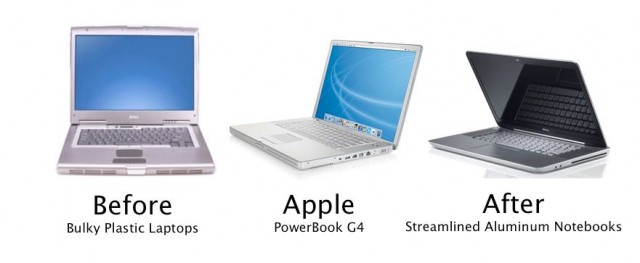Remember how ugly laptops used to be? Bulky plastic behemoths that did the job, sure, but looked just terrible, and were fragile to boot. Apple’s shift to using aluminum to make their laptops’ chassises not only made their notebooks sturdier, they made them sexier. Laptops became fashion accessories for the first time, and Apple began to cultivate an aura of prestige, minimalism and class. The advantages of Apple’s approach to laptop designs only continued over time as Cupertino adopted a unibody construction system that allowed them to carve a MacBook’s case out of a single block of aluminum, making them run cooler and be less likely to break than before, not to mention amp the sex appeal further. Look around at Windows notebooks today and you can see Apple’s influence: while Cupertino still leads in design and sex appeal, Apple proved to notebook makers that they could no longer ignore the aesthetics of their devices.
It’s hard to believe, but before 1999, the music industry just couldn’t figure out how to make money off of MP3s. Instead, the most popular music service out there was Napster, a file-sharing service that allowed users to indiscriminately trade songs to their hearts content.
According to the RIAA, Napster caused billions of dollars in losses… so when Apple came around and said they were going to come out with an online music store called iTunes where each track cost $0.99, the music labels were pretty happy to sign .
They’ve grumbled since about that deal, but it isn’t a stretch to say that iTunes not only saved digital music by making it mainstream enough for even your grandmother to enjoy. And while there are many complaints to be leveled at iTunes in regards to being bloated, it is still a remarkably elegant program, capable of cataloguing all of your media and getting it on to other devices, easy as a breeze.
iTunes is such a juggernaut in the digital music arena that there are few real competitors. Amazon MP3 duplicates the media buying capabilities of iTunes, but not the device syncing or the library management aspects. In fact, the only real alternatives to iTunes these days are streaming music subscription services like Spotify.
Now that Apple is preparing to roll out their iCloud service, iTunes is likely to become a less important program as time goes on, but there’s no doubt it changed —and arguably even saved — the digital music industry.
The PC industry has been playing around with the idea of pint-sized ultraportable laptops for years, but when Asus released its first Eee PC in 2007, they finally found their model: netbooks. Using low-voltage Intel Atom CPUs, netbooks had great battery life and attractive prices… but bad performance, cramped keyboards, tiny screens and cheap designs.
For years, everyone asked Apple when they’d get in on netbooks, but Steve Jobs held firm: netbooks suck. “Netbooks aren’t better than anything, they’re just cheap laptops,” he said.
In late 2010, Apple finally showed the industry how the ultaportable notebook should be done with the second-generation MacBook Air. Starting at just $999, these entry-level machines were more expensive than netbooks, but had incredible displays, fantastic battery life, full-sized keyboards, real processors and blistering fast speeds thanks to Apple’s adoption of solid state memory instead of traditional spinning hard drives.
In releasing the 2010 MacBook Air, Apple basically killed netbooks overnight. Now the competition is only talking about ultrabooks, which are just clones of the MacBook Air. Even so, the competition is finding that it just isn’t easy to undercut Apple on price, thanks to Cupertino’s manufacturing clout. It’s going to take them awhile to catch up.
![Before / Apple / After: How Apple Has Led The Tech Industry Every Step Of The Way [Gallery] Creative_Wallpaper_Apple_Viva_la_Revolution_018884_](https://www.cultofmac.com/wp-content/uploads/2011/09/Creative_Wallpaper_Apple_Viva_la_Revolution_018884_.jpg)




